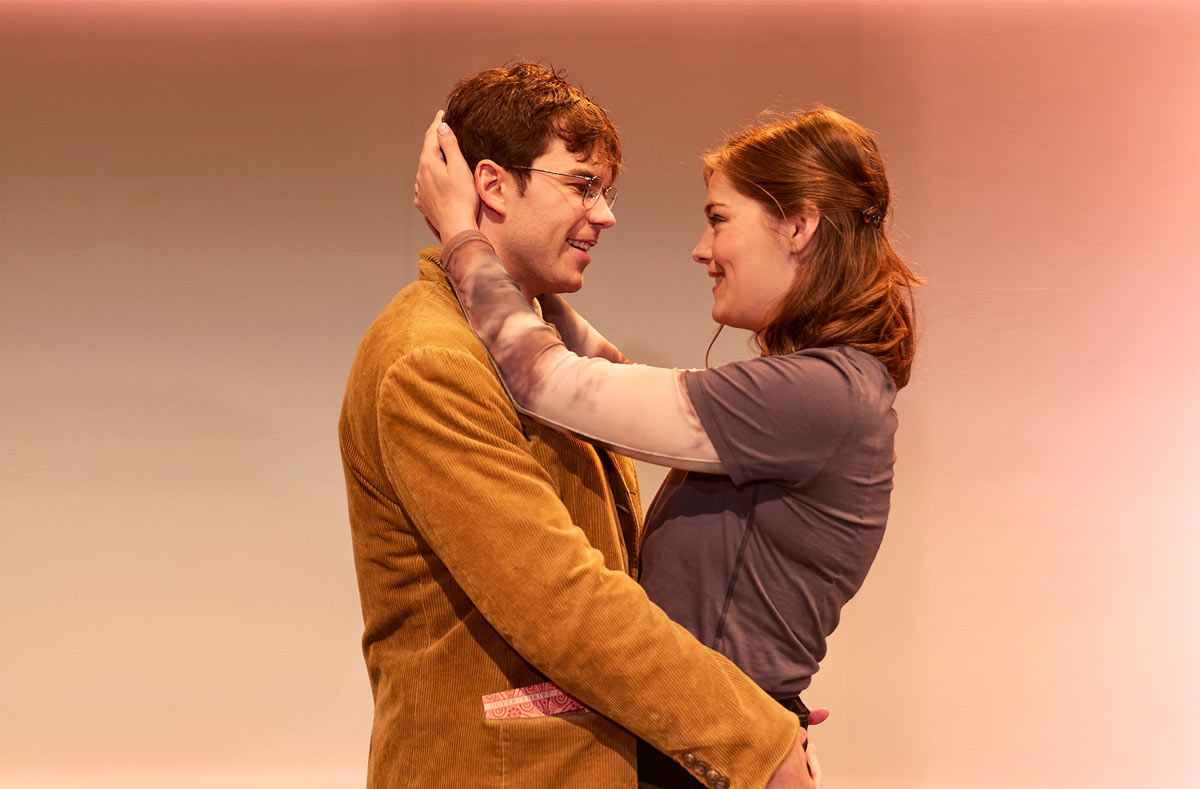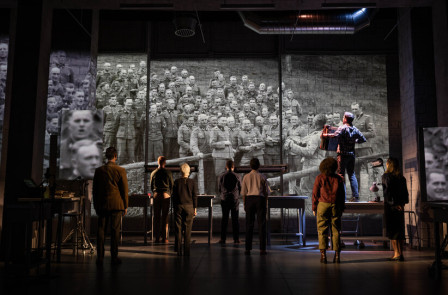Review: THE SHAPE OF THINGS at Park Theatre
Neil LaBute’s 2001 story was originally a stage play but gained more traction in the public’s mind as a movie version starring Rachel Weisz and Paul Rudd. Here, reimagined for the intimate Park Theatre, director Nicky Allpress has once again tapped into the fascinating realm of relationship power-play and manipulation.
 Luke Newton and Amber Anderson in The Shape of Things at Park Theatre. Photo by Mark Douet.
Luke Newton and Amber Anderson in The Shape of Things at Park Theatre. Photo by Mark Douet.
Nerdy Adam (Luke Newton) falls victim to the attentions of Evelyn (Amber Anderson) a confident and controlling young creative who wastes no time in identifying his failings and bringing him up to scratch so that he might serve as a suitable boyfriend — or should that be puppet? Meanwhile, close friends Phillip (Majid Mehdizadeh-Valoujerdy) and Jenny (Carla Harrison-Hodge) begin to discern subtle behavioural changes in their friend as the more obvious physical transitions mount. Contact lenses replace specs, hairstyle and clothing get a makeover and even persuading her subject that a nose job is required, becomes essential if Evelyn is to effectively demonstrate control and influence.
What starts as an apparent chance meeting between a young artist intent on expressing her disdain for an inauthentic sculpture (by means of a spray can) and a lowly gallery worker charged with protecting such pieces, morphs into something far more insidious. Long-held friendships buckle under the strain of suspicion, or require deception if they are to be maintained and explored beyond their original parameters.
Given some of the gasps —especially emanating from female audience members — LaBute’s ideas around fidelity and dishonesty don’t seem to have lost any of their stinging shock value. Throw away literary references populate the piece, including mention of strawberry embroidered handkerchiefs (by which Desdemona is damned in Othello) and the creative team have enjoyed incorporating period music including an especially apposite track by Space, The Female of the Species (…is more deadly than the male)! Perhaps most sinister of all is the seeming emotional disconnect displayed by the perpetrator, who hints at childhood trauma but reveals little to indicate her motives. At the end, we are left to ponder what might transpire between the two as they sift through the wreckage of their very public revelation.
The play’s potency (some might argue, ugliness) is that despite stretching credulity, there’s an unmistakable thread of brutal honesty running through it. Yes, LaBute’s creation still has the power to shock, because fundamentally, it deals with human nature — duplicity, conceit, manipulation, selfishness, eagerness to please, desire to control and pure truth, even when that truth is as ugly as all hell.
Latest News

 Beatrice Penny-Touré to join West End production of THE PHANTOM OF THE OPERA
6 February 2026 at 13:59
Beatrice Penny-Touré to join West End production of THE PHANTOM OF THE OPERA
6 February 2026 at 13:59

 Initial cast and creative team for ROSIE A NEW MUSICAL West End premiere concert
6 February 2026 at 10:02
Initial cast and creative team for ROSIE A NEW MUSICAL West End premiere concert
6 February 2026 at 10:02

 Review: MONSTERING THE ROCKETMAN at Arcola Theatre
6 February 2026 at 09:01
Review: MONSTERING THE ROCKETMAN at Arcola Theatre
6 February 2026 at 09:01

 HERE THERE ARE BLUEBERRIES at Stratford East - First look images released
5 February 2026 at 15:35
HERE THERE ARE BLUEBERRIES at Stratford East - First look images released
5 February 2026 at 15:35